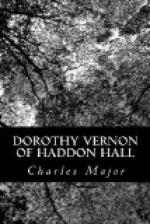“We cannot help thinking that our guilty consciences, through which we see so plainly our own evil, are transparent to all the world. In that fact lies an evil-doer’s greatest danger,” said I, preacher fashion; “but you need have no fear. What you have done I believe is suspected by no one save me.”
A deep sigh of relief rose from the girl’s heaving breast.
“Well,” she began, “I will tell you all about it, and I am only too glad to do so. It is heavy, Malcolm, heavy on my conscience. But I would not be rid of it for all the kingdoms of the earth.”
“A moment since you told me that your conduct was good and pure and sacred, and now you tell me that it is heavy on your conscience. Does one grieve, Dorothy, for the sake of that which is good and pure and sacred?”
“I cannot answer your question,” she replied. “I am no priest. But this I know: I have done no evil, and my conscience nevertheless is sore. Solve me the riddle, Malcolm, if you can.”
“I cannot solve your riddle, Dorothy,” I replied; “but I feel sure it will be far safer for each of us if you will tell me all that happens hereafter.”
“I am sure you are right,” she responded; “but some secrets are so delicious that we love to suck their sweets alone. I believe, however, your advice is good, and I will tell you all that has happened, though I cannot look you in the face while doing it.” She hesitated a moment, and her face was red with tell-tale blushes. She continued, “I have acted most unmaidenly.”
“Unmaidenly perhaps, but not unwomanly,” said I.
“I thank you,” she said, interrupting my sentence. It probably was well that she did so, for I was about to add, “To act womanly often means to get yourself into mischief and your friends into as much trouble as possible.” Had I finished my remark, she would not have thanked me.
“Well,” said the girl, beginning her laggard narrative, “after we saw—saw him at Overhaddon, you know, I went to the village on each of three days—”
“Yes, I know that also,” I said.
“How did you—but never mind. I did not see him, and when I returned home I felt angry and hurt and—and—but never mind that either. One day I found him, and I at once rode to the well where he was standing by his horse. He drew water for Dolcy, but the perverse mare would not drink.”
“A characteristic of her sex,” I muttered.
“What did you say?” asked the girl.
“Nothing.”
She continued: “He seemed constrained and distant in his manner, but I knew, that is, I thought—I mean I felt—oh, you know—he looked as if he were glad to see me and I—I, oh, God! I was so glad and happy to see him that I could hardly restrain myself to act at all maidenly. He must have heard my heart beat. I thought he was in trouble. He seemed to have something he wished to say to me.”
“He doubtless had a great deal he wished to say to you,” said I, again tempted to futile irony.




